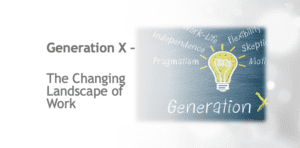Generation X and the Changing Landscape of Work
The workforce has evolved significantly over the years, and each generation brings its unique perspectives, values, and approaches to the table. Generation X, born between the early 1960s and early 1980s, finds itself at the intersection of traditional work models and the rapid technological advancements that have shaped the modern workplace. Here we explore how Generation X has adapted to the changing landscape of work, facing challenges head-on while leveraging their strengths to seize new opportunities.
- The Bridge Between Analog and Digital: Generation X grew up in a world that was on the cusp of technological transformation. They witnessed the transition from typewriters to computers, from landlines to smartphones. This unique positioning has equipped them with adaptable skills, enabling them to navigate both analogue and digital work environments. They understand the value of face-to-face communication while being proficient in various digital tools and platforms.
- Work-Life Balance Pioneers: This generation played a crucial role in reshaping the concept of work-life balance. Many Gen Xers saw their parents’ dedication to work at the cost of personal lives, prompting them to seek a healthier equilibrium. As a result, they advocated for flexible work arrangements and pioneered the idea that productivity should be measured by output rather than hours spent in the office.
- Entrepreneurial Spirit: Generation X witnessed economic fluctuations and corporate downsizing, which fostered an entrepreneurial spirit. Many Gen Xers turned to starting their businesses in order to have more control over their careers. This generation values independence, innovation, and self-reliance, often choosing to create their opportunities in the gig economy or by launching start-ups.
- Embracing Leadership Roles: As the Baby Boomer generation retires, Generation X is stepping into leadership roles. Their ability to bridge the gap between different age groups and their experience in navigating diverse work environments make them effective leaders. Gen X leaders often prioritise collaboration, open communication, and mentoring, creating a more inclusive and cohesive work culture.
- Continuous Learning and Skill Development: Generation X recognises the importance of staying relevant in a rapidly changing job market. They have embraced the concept of lifelong learning and are not afraid to upskill or reskill as needed. This adaptability has allowed them to remain competitive, even as automation and AI reshape job roles.
- Challenges Faced: Despite their strengths, Generation X has faced its share of challenges. They sometimes find themselves caught between the expectations of older, more traditional workplace norms and the demands of younger, tech-savvy colleagues. Additionally, they may feel overlooked in discussions about generational differences, as the focus often shifts between Baby Boomers and Millennials.
- The Future of Work for Generation X: As the workplace continues to evolve, Generation X will play a vital role in bridging the gap between generations. Their ability to balance technological fluency with timeless work ethics will be invaluable. With the rise of remote work, flexible arrangements, and the gig economy, Gen Xers will continue to embrace opportunities to redefine work on their terms.
Conclusion
Generation X, often referred to as the “forgotten middle child” between Baby Boomers and Millennials, brings a unique blend of experiences and perspectives to the modern workplace. Their adaptability, work-life balance advocacy, entrepreneurial spirit, and commitment to continuous learning position them as a generation well-equipped to navigate the complexities of today’s work environment.
As the workforce continues to transform, Generation X stands as a testament to the power of resilience and innovation in the face of change.


